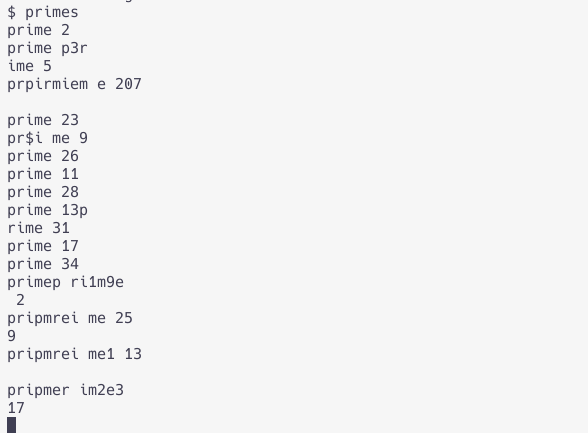MIT 6.S081 Lab1 Util
6.S081是原6.828 lab的简单重置版(萌新青春版),以RISC-V和xv6为例讲OS,Lab还挺有意思的。
之前都是学的ARM,之前自己看csapp的时候x86汇编那几章全跳过去了。正好最近刚考完最后一门课,老板留我们7月在学校里打黑工(其实完全没啥事干),可以闲下来做点一直想做但没空的Lab了。
Lab1
第一个Lab,都很简单,帮你熟悉一下xv6和系统调用。
直接照着提示做就好了。
测试可以用make grade测试全部成绩。测试单个成绩可以用./grade-lab-util xxx 或者make GRADEFLAGS=xxx grade
有的时候需要测试打印
Boot xv6
先下载
1 | git clone git://g.csail.mit.edu/xv6-labs-2020 |
然后编译运行xv6。
sleep(easy)
Implement the UNIX program
sleepfor xv6; yoursleepshould pause for a user-specified number of ticks. A tick is a notion of time defined by the xv6 kernel, namely the time between two interrupts from the timer chip. Your solution should be in the fileuser/sleep.c.
这个也没有什么好说的,让你熟悉一下系统调用。
1 |
|
然后看一下测试(grade),一次通过,简单。

pingpong(easy)
Write a program that uses UNIX system calls to ‘’ping-pong’’ a byte between two processes over a pair of pipes, one for each direction. The parent should send a byte to the child; the child should print “
: received ping”, where is its process ID, write the byte on the pipe to the parent, and exit; the parent should read the byte from the child, print “ : received pong”, and exit. Your solution should be in the file user/pingpong.c.
1 |
|
熟悉一下fork和管道呗。
一开始传的是”ping”, “pong”,各占四个byte,又读了一遍题发现这里只让用1个byte,注意到ping和pong只差一个字母,那就传i和o好了。
这个小玩意本身没什么难的,已经对c完全手生的我愣是做了一个多小时。pipe的0是读,1是写,一开始我搞反了,下午上一个水课的时候又困又饿,调了半个小时百思不得其解。这个Lab几个作业里面做的最失败的一个(没想到竟然栽在一个easy上了),写了一点注释整理了好几次思路才pass。

primes
Write a concurrent version of prime sieve using pipes. This idea is due to Doug McIlroy, inventor of Unix pipes. The picture halfway down this page and the surrounding text explain how to do it. Your solution should be in the file
user/primes.c.
素数筛,这个之前看go语言圣经的经典例子。 扔给你的这篇论文Bell Labs and CSP Threads 扯了一下CSP模型的,你看这作者Russ Cox,霍,这不是go的…..再一看素数筛、共享内存、CSP模型介绍、 后面还提了一嘴go,引用里一堆Robe Pike等熟悉的名字。写过go的孩子是不是有一股我们在哪里见过的感觉……
1 | int |
一开始觉得这有什么难的,仿照go版本写一个不就完事了。也没看提示,在我本机上明明是好的扔到qemu的xv6上就开始乱了,调了半天。然后又读了一遍看到提示Be careful to close file descriptors that a process doesn't need, because otherwise your program will run xv6 out of resources before the first process reaches 35.
然后发现打印出来有时是正确的,有时是乱序的。

最后又搜了一下, Coroutine prime number sieve, Douglas McIlroy在这里面给了一个c的例子,用dup来复制文件描述符,然后关闭管道。对照着这个我检查了一下,是少了一个 close(p[0]);
比go麻烦好多……..
find
Write a simple version of the UNIX find program: find all the files in a directory tree with a specific name. Your solution should be in the file
user/find.c.
这个不难,处理细节有点繁琐,注意递归的时候不要把.和..算进去就好了。可以参考ls.c和grep.c(选做正则匹配)。照抄ls的代码然后写一个简单的DFS或者BFS就可以了(目录是个树,如果不考虑软链接)。
xargs
实现xarg命令,就用fork和exec实现就好了。这些碰到问题可以直接参考(抄 袭)一下xv6的源码或者gnu coreutils的实现。代码略长,不贴了。注意这里每次调试的时候要make clean清除编译缓存。
贴一个xargs用法的比较好的文章:Linux xargs命令详解 为数不多的对这个命令的用心介绍。
题外话
大三的时候学的微嵌(ARM的),当时讲的也水,大作业和实验也水(什么跑马灯驱动啊、ARM汇编啊,c内联汇编啊,还有一点FPGA),考试全都是抄书抄PPT写概念。深感当时学的太水了,走马观花看了一堆概念,实际上根本不会。
现在在实验室基本除了划水就是做一些CRUD的垃圾项目,什么XX管理系统,什么XX网站,什么基于机器学习的论文灌水;偶尔维护一下师兄师姐乱七八糟的祖传代码,感觉再这样虚度时光就要变成一个废人了,现在连c都生疏了。暂时打算从6.828和6.824开始,后面可能会做一点数据库的。
Verilog和VHDL这些暂时不打算再碰了,现在只想用c写。现在实验室有没有FPGA的板子,现在对RTL那些几乎也忘得差不多了,逻辑综合那些更别提了,本科那基本verilog的书当时疫情毕业也都送人了。
实验室已经两三年没人搞硬件了,堆在角落里的示波器和焊台也已经蒙了一层灰尘,罪过罪过。估计以后也没什么焊板子调运放的机会了…….
突然发现用go已经用习惯了,甚至感觉写go还挺舒服。。。用习惯了go的管道defer写close,写这个的时候老忘了close。而且我至少不下十次忘记末尾加分号;了,完了,写go写出肌肉记忆了。
(说起来Go写多了真是有点被惯坏了,现在再回去写c,手动管理内存和指针都觉得好麻烦,管道和进程也觉得不顺手。另一个非常非常难受的地方是,习惯了go很快的编译速度,现在每次等编译都好难受啊)
参考和推荐
链接
https://pdos.csail.mit.edu/6.828/2020/schedule.html
xv6的资料
https://pdos.csail.mit.edu/6.828/2020/xv6/book-riscv-rev1.pdf
哈工大的课,跟6.S081前面几个lab差不多。
https://hitsz-lab.gitee.io/os_lab/
risc-v 资料
http://crva.ict.ac.cn/documents/RISC-V-Reader-Chinese-v2p1.pdf
调试:
https://twdlll.github.io/2020/11/10/6.S081-2/
https://zhuanlan.zhihu.com/p/166413604 clion调试
https://www.cnblogs.com/KatyuMarisaBlog/p/13727565.html vscode调试
其他的一些推荐
The Linux Programming Interface: A Linux and UNIX System Programming Handbook(中文版:《Linux/Unix系统编程手册》上下两册,下册翻译的很烂),相当不错的工具书,可以放在手边当参考书和工具书用。
Linux man pages online 在线参考手册,必备
https://github.com/SI-RISCV/e200_opensource 没看过,据说还行。
现代操作系统
《现代操作系统:原理与实现》 上交IPADS的,我还没买。据说相当不错。(这本我自己一点也没看过,)
前置工作
c语言, 大概弄懂k&r那本The C Programming Language就可以开工了。当然,懂得越多越好,多多益善。
菊巨可以用Rust哦,贵清rCore那边的课据说挺好的(群友们人均Rust, 就只本菜不会Rust了)
gdb等调试手段要熟, 没法调试等着两眼抓瞎吧。
熟悉链接库和编译那一套,Makefile什么的会用就行了。不熟悉编译的去编译个LFS(Linux from Scratch)就差不多了。
一些基础的书和知识,比如csapp等书可以先看看。
参考手册和工具书先备着,RISC-V的资料也备着。xv6有很多可以参考的地方。
xv6的资料在这里:https://pdos.csail.mit.edu/6.828/2020/xv6.html
这有一个中文的翻译:(版本略老,是x86的)
https://github.com/ranxian/xv6-chinese